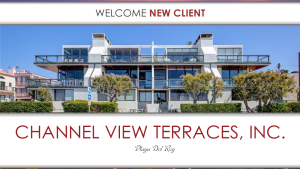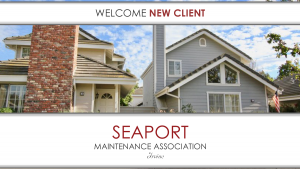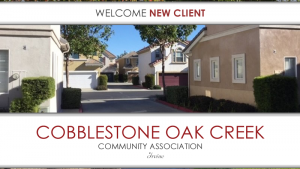 Attorneys who practice community association law are often asked whether a community manager is covered by the attorney-client privilege. In general, the attorney-client privilege shields communications intended to be confidential between an association and its attorney. Materials prepared by an attorney and that reflect the attorney’s thoughts, conclusions or opinions (attorney work product) may also be protected against discovery by adverse parties provided that appropriate precautions are taken to ensure that the confidential work product falls squarely within the scope of California’s civil work product privilege.
Attorneys who practice community association law are often asked whether a community manager is covered by the attorney-client privilege. In general, the attorney-client privilege shields communications intended to be confidential between an association and its attorney. Materials prepared by an attorney and that reflect the attorney’s thoughts, conclusions or opinions (attorney work product) may also be protected against discovery by adverse parties provided that appropriate precautions are taken to ensure that the confidential work product falls squarely within the scope of California’s civil work product privilege.
The Attorney Client Privilege is the right of a client to prevent another from disclosing a confidential communication between the client and their lawyer. (See Evidence Code section 954). A “confidential communication” means information transmitted between a client and their lawyer in the course of that relationship and in confidence by a means which, so far as the client is aware, discloses the information to no third persons other than those to whom disclosure is reasonably necessary for the transmission of the information or the accomplishment of the purpose for which the lawyer is consulted. (See Evidence Code section 952.) California courts have held that “the privilege extends to communications which are intended to be confidential, if they are made to attorneys, family members, business associates, or agents of the party or his attorneys…, when disclosure is reasonably necessary to further the interest of the litigant”. (Zurich v. Superior Court (2007) 155 CA4th 1485, 1495-1496.) “While involvement of an unnecessary third person in attorney-client communications destroys confidentiality, involvement of third persons to whom disclosure is reasonably necessary to further the purpose of the legal consultation preserves confidentiality of communication. (Zurich, supra, at 1496.)
The California Supreme Court has recognized that a corporation such as an Association can only communicate through an officer, employee, or some other person. (Chadbourne v. Superior Court (1964) 60 Cal2nd 723, 732.) “(T)he privilege is not waived simply because the communication is made through an agent of the client or of the attorney.” Chadbourne, supra, at 735. The American Law Institute recognizes the need for corporate employees and agents to have access to confidential materials. The Restatement Third of Law Governing Lawyers provides that when a client is a corporation, the privilege extends to an agent of the organization who reasonably needs to know of the communication in order to act for the organization. (See Restatement Third, Section 73). The corporate agent may be apprised of privileged communications even after they are made such as by examining books and records of the corporation containing privileged communications in order to conduct the affairs of the organization in light of the legal services provided. (See Zurich, supra, at 843.)
In a leading treatise on the subject of the privilege in the context of community associations, the author explains the role of a third-party management company as follows.
Communications between the manager and the attorney, authorized by the association and concerning a privileged issue, are privileged if the parties intended them to be confidential. ***Because management personnel are responsible for the day-to-day operations of the community and implement directives of the board, they are important links between the association and its attorney. As the keeper of an association’s records and files, management has a significant involvement in formulating the association’s legal position in a case, providing both factual information which is necessary for the litigation and advice to the board as to what actions need to be taken to maintain and protect, for example, the association’s finances and the physical plant. By necessity, the attorneys must consult with them, obtain information from them, and relay information to them regarding legal issues. Communications between the association’s attorneys and management regarding litigation and other association legal matters thus are communications between the attorneys and their client, the association.” See Karloff, “The Attorney-Client Privilege and Confidentiality in Community Associations”; CAI College of Community Association Lawyers Law Seminar 2009.
Accordingly, there is little doubt that privileged communication through the third-party management company is both necessary and in furtherance of the interests of the Association in effectively communicating with legal counsel. To ensure applicability of the privilege, association counsel can prepare a general Board Resolution authorizing the management company and its employees to act as agents of the Association where necessary to further communications with legal counsel.
With respect to the so called Attorney Work Product Privilege, Boards and Managers should be aware of the following. This privilege or “Work Product Doctrine” is not an evidentiary privilege but rather a policy codified by statute to preserve the privacy of legal counsel to thoroughly prepare their legal theories and strategies, free from the unnecessary intrusion of their adversaries. (Code of Civil Procedure (“CCP”) section 2018.020.) Materials created or derived from an attorney’s work reflecting the attorney’s evaluation of the law or facts qualifies as work product. (Coito v. Superior Court (2012) 54 CA 4th 480, 488.) The doctrine applies to tangible things such as written expert reports, diagrams, appraisals, and witness statements. Any report or writing prepared in anticipation of litigation or for purposes of investigating potential claims for the benefit of the Association should be prepared under the supervision of and transmitted in care of legal counsel. In the case of expert review, the decision whether to request a formal written report should not be made until legal counsel and the Board can evaluate the preliminary findings and recommendations of the expert consultant.
It is also important to note that attorney work product is divided into two categories – absolute and qualified work product. CCP section 2018.030(a) provides absolute protection from discovery of any “writing that reflects an attorney’s impressions, conclusions, opinions, or legal research or theories”. CCP section 2018.030(b) provides qualified protection for work product that does not fall under the “absolute” protections of section 2018.030(a). It only protects such work product “unless the court determines that denial of discovery will unfairly prejudice the party seeking discovery in preparing that party’s claims or defense.” For example, a witness statement obtained by an attorney’s investigator where few if any questions were asked would likely reveal nothing of the attorney’s impressions, conclusions or opinions.
The important take away here for Associations and their management representatives is that when confronted with the threat of a lawsuit, or during the investigation of a potential claim against the Association, Boards and managers should think carefully about whether to interview witnesses or retain the services of an expert consultant without the assistance and involvement of legal counsel. A failure to engage counsel early in such process may expose any written report or witness statement to discovery by opposing parties in the event that litigation ensues.
 |
Understanding and protecting confidential communications and work product involving representation by the Association’s legal counsel is an important function of the management company’s agency for the Association and is in furtherance of the management company’s fiduciary duties owed to its association clients. |
-Blog post authored by TLG Attorney, Bradley D. Walker, Esq.
 It’s our privilege to welcome The Williamshire Owners Association to Tinnelly Law Group’s growing family of HOA clients.
It’s our privilege to welcome The Williamshire Owners Association to Tinnelly Law Group’s growing family of HOA clients. HOA Lawyer Blog
HOA Lawyer Blog


 It’s our privilege to welcome Amethyst at Parasol Park Neighborhood Association to Tinnelly Law Group’s growing family of HOA clients.
It’s our privilege to welcome Amethyst at Parasol Park Neighborhood Association to Tinnelly Law Group’s growing family of HOA clients. Conflicts of interest
Conflicts of interest It’s our privilege to welcome Channel View Terraces, Inc. to Tinnelly Law Group’s growing family of HOA clients.
It’s our privilege to welcome Channel View Terraces, Inc. to Tinnelly Law Group’s growing family of HOA clients. It’s our privilege to welcome The Resort Master Corporation to Tinnelly Law Group’s growing family of HOA clients.
It’s our privilege to welcome The Resort Master Corporation to Tinnelly Law Group’s growing family of HOA clients.
 It’s our privilege to welcome Seaport Maintenance Association to Tinnelly Law Group’s growing family of HOA clients.
It’s our privilege to welcome Seaport Maintenance Association to Tinnelly Law Group’s growing family of HOA clients. It’s our privilege to welcome Nevis Milano, Inc. to Tinnelly Law Group’s growing family of HOA clients.
It’s our privilege to welcome Nevis Milano, Inc. to Tinnelly Law Group’s growing family of HOA clients. Attorneys who practice community association law are often asked whether a
Attorneys who practice community association law are often asked whether a  It’s our privilege to welcome Cobblestone Oak Creek Community Association to Tinnelly Law Group’s growing family of HOA clients.
It’s our privilege to welcome Cobblestone Oak Creek Community Association to Tinnelly Law Group’s growing family of HOA clients.